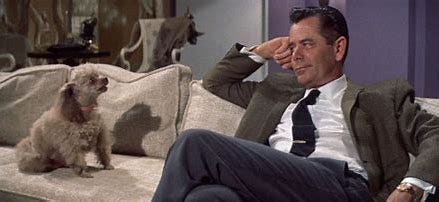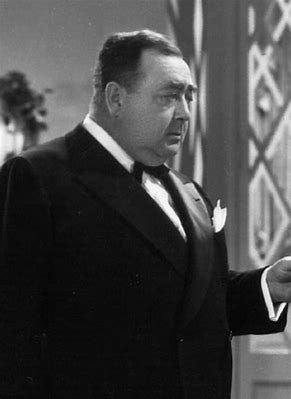I’m a screwball comedy guy (just wait til next weekend!), so the quintessential Hollywood dad for me will always be Eugene Pallette. You probably don’t know the name - I had to look it up myself today - but if you love old movies, you’ll recognize this figure immediately:
Back then, before the government food pyramid came along, only the ultra-rich were able to get that portly, so he was often cast as the wealthy industrialist father of the ditzy socialite in great screwball classics like My Man Godfrey and The Lady Eve. If you can’t wait for next week to learn about the greatest screwball comedy of them all, do go ahead and watch The Lady Eve, it’s hilarious.
So much for the comic relief. When it comes to leading men in the paternal role, Hollywood’s go-to was Spencer Tracy. Winning back-to-back Oscars for playing father figures in Captains Courageous and Boys Town shot him to superstardom, and of course he was then the natural choice for the enduring classic Father of the Bride, and just as naturally was the go-to dad to bring someone home to in Guess Who’s Coming to Dinner?.
If you haven’t subscribed to the Esolen family’s indispensable substack, and you have any interest in classic film, the great American songbook, poetry, hymns, and good old fashioned wonder, you owe it to yourself to do so - and then you would already know all about Kipling and Captains Courageous.
Maybe it was all the lies of Inherit the Wind, maybe it was something else, but frankly Tracy always rubbed me the wrong way. Let me nominate instead for your paternal cinematic consideration one of my all-time favorite actors of the Golden Age, not as legendary as Cary Grant or Jimmy Stewart, but pitch perfect in his own way, and far better at being a movie dad than many more famous names: Glenn Ford.
Ford could do it all - westerns, film noirs, comedies, romances - because he was the quintessential everyman. What made him so great in those famous film noirs - think The Big Heat - is the Glenn Ford patented ‘slow burn.’ He’s just an ordinary guy, slowly being driven deeper and deeper into mystery/conspiracy/revenge/murder as the plot unfolds. Same situation in his greatest westerns, like 3:10 To Yuma: he doesn’t start off as some heroic gunslinger or sheriff, just a regular rancher, and he gradually realizes he has to face off against a deadly gang. The movies wouldn’t work if he wasn’t such an appealingly ordinary guy to start, the whole point of them is how this likeable fella, who could be your neighbor, turns into an action hero when pressure is applied. Well, take away the pressure, and you still have the charming neighborliness of him, put to good use in romances like Dear Heart (there’s Angela Lansbury again) or comedies like The Gazebo (Carl Reiner once more!).
If you want the full Glenn Ford slow burn experience for Father’s Day, Ransom! is the way to go. I haven’t been able to watch the movie since I’ve had children of my own, the kidnapping plot is just too intense, but if you think you can handle it, I guarantee you’ll never forget it. They remade it with Mel Gibson, which was a terrible choice, because say what you want about Gibson, he is anything but ordinary - the guy made famous as the crazy loose cannon in the Lethal Weapon films is as unlike the unthreatening, mild-mannered Glenn Ford as it gets. Very, very few actors can pull off what Ford regularly did - the likes of Schwarzenegger and Stallone can thrive in the big action finales, someone like Tom Hanks can pull off the likeable dad type, but to go so convincingly from one to the other ain’t easy.
If you, like me, can’t stomach Ransom!, and would like to see Ford with all his Canadian (yes, he’s Canadian!) charm and none of the burn, a fun, sweet Father’s Day movie is The Courtship of Eddie’s Father. Nothing too deep, just a fun, light movie, with the young Ron Howard being his cute self, trying to get his widowed dad to notice Shirley Jones in the apartment across the hall. Give it a try for a sweet Father’s Day treat, I hope you enjoy it.
Happy Father’s Day to all!




Hope you have a great Father's Day. Our sons are coming home to celebrate it. My husband is a wonderful father of two Eagle Scouts. He's the one who went to the Scout meetings and camped out with them, who took care of us and helped put them to bed at night. A good father is irreplaceable, and a light to children.
Spencer Tracy in Boys Town was wonderful. He brought real grace to that role. A priest and father to lost boys.
Hello, Doctor. I take weekends off from harassing the medical profession, at least about medical matters.
I'm delighted that you have discovered Eugene Pallette. He may have been a limited actor, but like William Frawley, in the right part, he was peerless. Those kinds of guys were indispensable to Golden Era Hollywood.
Pallette's voice was a wonder of nature. It had an impossible to miss metallic quality for me. It sounded as though he might have had something cylindrical in place of a voice box.
I enjoyed your words about Glenn Ford, and agree with you. I can understand your aversion to Spencer Tracy. Pauline Kael once referred to Tracy's "boring pugnacity." Glenn Ford was a natural actor with an attractive understatedness in his acting.
In that regard he reminds me of a star somewhat before his time, Joel McCrea, who was incapable of giving a bad performance.
Screwball comedy: it's probably classed more as a farce than a screwball comedy, but "Arsenic and Old Lace" has always been my favorite. I cannot understand Cary Grant's supposed mortification at his performance as Mortimer Brewster. Grant's overacting makes the movie as funny as it is.
Otherwise, I agree with you about "The Lady Eve." Preston Sturges had an astounding seven year run in which he could do no wrong. Have you seen "The Palm Beach Story" and "The Great McGinty?" Both are wonderful. ( Some intellectual somewhere has probably written an article proposing that "The Great McGinty" should be thought of as the "anti Citizen Kane." ) And yes, as you probably know, Joel McCrea was a Sturges favorite. One of the funniest photos I have ever seen was taken from a vantage in the studio above a ladder. McCrea is lying on his back, supposedly in the middle of a nighttime storm. Sturges is at the top of the ladder, pouring a huge pitcher of water onto McCrea's face.
Do you know the work of Val Lewton? His is one of the most interesting stories from that period. He worked for RKO, which had been nearly bankrupted by "Citizen Kane's" box office flop. Their executives had the bad shakes because of their fear that "The Magnificent Ambersons" was about to suffer the same fate. Desperate to save the studio, these guys realized something one day: Universal had stopped making horror films after about 1935. The RKO guys thought there might be a forlorn market for some new films of a nonrealistic nature. They pitched an idea to Val Lewton. Would he be willing to produce some "B" horror films, no more than seventy - five minutes in length, maximum budget $200,000? They would tell him the title, he would go away, and come back in six weeks with a movie. He agreed. The first title they threw at him was "Cat People."
A few weeks later, he came back with a classic. I find it likely that a lot of people have sloughed off that movie because their instincts are that it's probably ridiculous. It's anything but ridiculous, and rightly, it was a huge hit, and rescued RKO. Manny Farber's essay about Lewton is highly laudatory. Lewton was a producer. He didn't direct, though he appears to have written the final draft of all of the screenplays. But as Farber wrote, Lewton relished taking a group of young people "who delighted in being creative without necessarily being fashionable" and turning them loose. He may have been the best boss in the history of capitalism.
Lewton's work couldn't have been more different from Sturges'. Probably the most frequently used word to describe "Cat People" is "moody." "Unsettling" turns up often, also. They weren't exactly horror films, but they were undeniably infused with the supernatural. My favorite is "The Seventh Victim." It may be my favorite movie, period. The sequel to "Cat People," "The Curse of the Cat People," was voted the 17th greatest horror/supernatural film of all time in a fairly recent poll of British film critics and scholars. As was true of all the Lewton films, it was made in beautiful black and white, and is a gorgeous, almost magical thing to look at. The little girl who is essentially the star of the film, Ann Carter was as talented as Margaret O'Brien. She contracted polio not long after she made that movie, and was out of the business for several years. She was too talented not to get back in. She was in a Bogart film from about 1947, which I don't remember the title of. Bogart, who generally wasn't all that fond of kids, I think, took to her. He nicknamed her, "Nostrils." She got bored with showbiz and became a teacher, a wife, and a mother.
Lewton's career was contemporaneous with Sturges' great run. Death got in Lewton's way. For Sturges, it was a run - in with Howard Hughes over a horse.
Lewton's films used many of the same sets as "Citizen Kane" and "The Magnificent Ambersons," most interestingly in the latter, a staircase. The staircase on which the Agnes Moorhead character ( Aunt Fanny? I don't remember ) has her hysterical breakdown in "The Magnificent Ambersons" is the same staircase the Kim Hunter character would walk down at her boarding school in "The Seventh Victim" the next year. If you're a stranger to Lewton and might not wish to remain so, my urging is that you start with "The Seventh Victim." For one thing, it has a scene which, as it develops in the first few seconds, will make you gasp. Neither Hitchcock nor Robert Bloch ever denied that the shower scene in "Psycho" might not have existed if not for that scene from "The Seventh Victim" seventeen years earlier.
"The Seventh Victim" was made in a world which did not think it strange to bookend a movie with a John Donne quote, and to have a compact but orthodox presentation of the Gospel in it. The one sad thing I know about that movie is that the young actor who plays the poet, a man whose name was, I think, Erford Gage, died heroically in the Battle of Iwo Jima.
The Lewton aesthetic is, without any exception I've ever run across, deeply admired by movie scholars. My hunch is that you'd take to it.
Happy weekend!